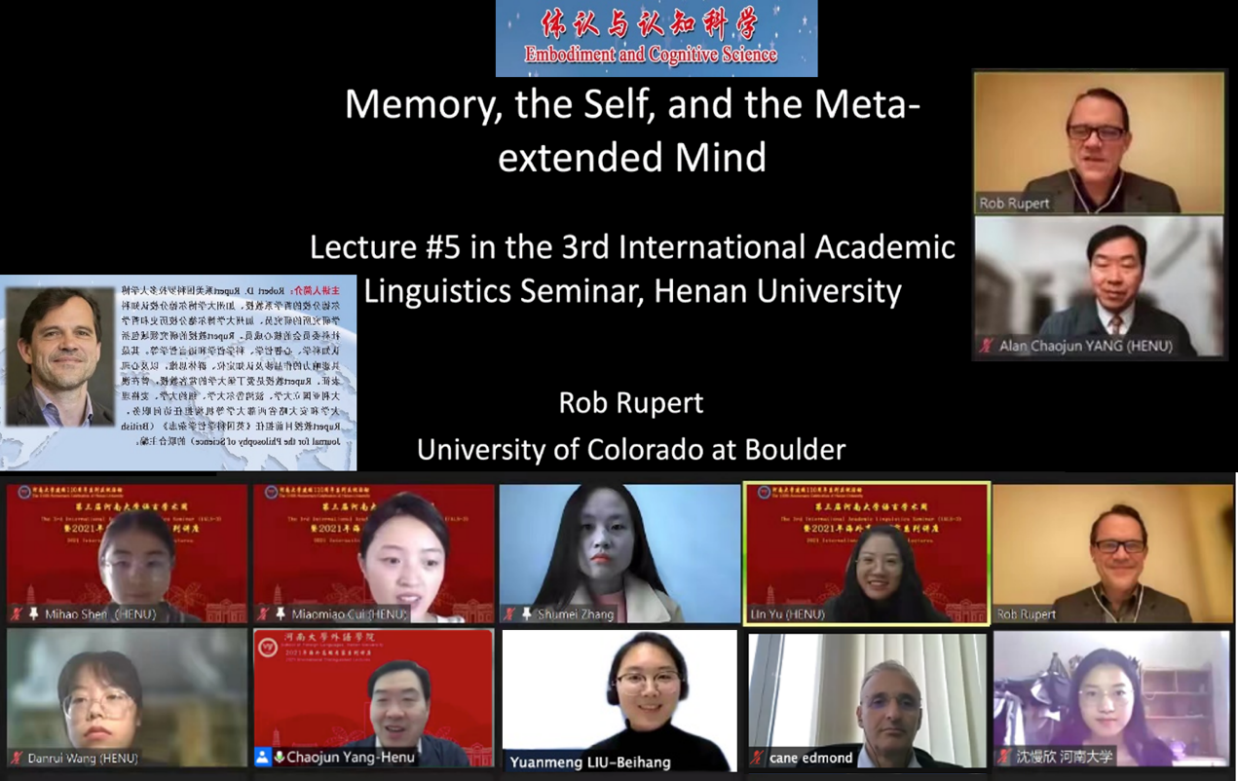
On November 19, 2021, Robert D. Rupert,Professor of Philosophy at the University of Colorado at Boulder,delivered hisfifth lecture to the teachers and students of School of Foreign Languages viaZoomandTencent Meeting at 11a.m.He is scheduled to give five lectures aboutEmbodimentand Cognitive Sciencefrom November 15 to November 19, 2021. The last lectureentitled “Memory, the Self, and Meta-extended Mind” was hosted by Prof. Chaojun Yang, Dean of School of Foreign Languages. Over 300 postgraduates and faculty members from the University of Munich, Peking University, Beijing University of Aeronautics and Astronautics, Wuhan University, Jiangsu University, Sichuan University, Sichuan University of foreign Chinese, etc., have joined the lecture.
The contents of these five distinguished lectures can be summarized as follows: (1) InLecture 1ofEmbodied Functionalism,Professor Robert D. Rupert systematically introduced the basic background, historical development and core claims of embodied functionalism. Proponents of the embodied view of cognition sometimes make sweeping claims on its behalf. One reads that, because cognition is embodied, there are no mental representations and that computational and functionalist theories of mind must be treated as relics of the past. In this lecture,ProfessorRupert paint a more conciliatory picture. He argue that we make the best sense of the history of cognitive science if we understand it as having had a substantive embodied component all along. Much of human cognition can be well described as the implementation of algorithms. But, which algorithms they are, among the infinity of possibilities, depends on the (often) fine-grained details of the body and its surrounding environment; the body and environment determine the relevant computational and functional facts, though more abstract modeling efforts are typically necessary to comprehend those facts. Thus, the most promising approach to cognitive science is an embodied functionalist approach, one that combines computational modeling with careful attention to bodily and environmental processes.(2) InLecture 2ofEmbodiment and Consciousness, many advocates for an embodied approach to cognition claim that the embodied perspective solves the fundamental philosophical problem of consciousness – that it seems to be something over and above, and not fully explained by, neural processing. In this lecture,ProfessorRupertcritically review some of the leading claims in this literature. He argued that none of these approaches delivered what they advertise, but that, when reinterpreted, neurophenomenology provided useful inspiration for the study of consciousness-related phenomena. The approachProfessorRupertrecommend explores consciousness-related phenomena within the framework of the most plausible human cognitive architecture, one that eliminates the so-called personal level, where it is often claimed that consciousness resides. (3) InLecture 3ofEnactivism and Sense-Making, the enactivist approach to cognition and mind represents a large tent. Those who consider themselves enactivists hold that cognition is for action, that cognition isanaction, that cognition does not consist in the building of internal models, that cognition is an extension of the fundamental goal-directedness found in the most rudimentary forms of life, that thinkers create their own cognitive worlds by interacting with their environments, and that cognition is a form of interactive sense-making. In this lecture,ProfessorRupertexamined such claims critically, arguing that much of what interests enactivists can be expressed naturally – and in less radical terms – if one eliminates the so-called personal level and allows for a less restrictive notion of mental representation.(4) InLecture 4ofPredictive Processing, the Self, and the Extended Mind, predictive processing (PP) models are typically built around the mechanism of prediction error minimization, a form of computation that brings the thinker’s models of the world into contact with incoming sensations, so as to adjust the thinker’s models when incoming sensation disagrees with model-based predictions of what those incoming sensory signals will be. After introducing the framework of predictive processing and prediction error minimization, as well as some of the sweeping claims made by its proponents,this lecture addresses three central questions: first, whether the human cognitive system is a prediction-error-minimization machine through and through; second, whether thinking of the human mind as a prediction-errorminimization system sheds light on the nature of the human self; and third, whether the framework of predictive processing lends support to the idea that the mind extends into the world.ProfessorRupert arguedthat the answer in all three cases was “probably not”. (5) InLecture 5ofMemory, the Self, and the Meta-extended Mind,ProfessorRupert introduced a philosophical puzzle concerns personal identity –what is constant throughout an individual’s life? Many philosophers have emphasized psychological continuity – in the form of continuous consciousness. A simple version of the memory-based approach would hold that each later stage in a single person’s life is wedded to the earlier stages, because it possesses all of the memories of the earlier stages, plus additional ones. The science of memory challenges such an approach, however,recent decades of research in cognitive science portray human memory as malleable, reconstructive, and prone to frequent errors and fabrications.ProfessorRupert appealed to the brain’s shifting effective connectivity – a kind of circuit or network-oriented connectivity directly relevant to psychological function. The result seems to be that, from a psychological perspective, the individual organism contains multitudes; it consists of distinct psychological systems at different times, frequently shifting from one to another.ProfessorRupert consideredtwo approaches one might take in response to this problem. The first is a version of the extended mind hypothesis – the meta-extended mind hypothesis – according to which the extended portion of the mind consists of the stable environmental structures that control or trigger changes in effective connectivity; it is there that the principle of continuity lies. As provocative as that approach might seem, I advocate for a second possibility instead, a version of the age-old idea that the persistence of the organism, not something psychological at all, determines personal identity.
At the end of the lecture, all the audience expressed their acknowledgement for this seminar (IALS-3), and took a photo together withProfessorRuperton the Zoom Meeting.ProfessorRupert’s series of these five lectures not only help the audience to illustrate the Embodiment and its application in Cognitive science, but also give them a penetrating insight of interdisciplinary research of psychology, philosophy and linguistics. In a nutshell, ProfessorRuperthas won a great deal of praise from teachers and students for his scientific frontiers and his witty personal charm.Thesignificance of international academic exchanges is always strengthened by School of Foreign Languages (HENU), and dozens of international academic lectures are held each year in various disciplines of IALS,andthe 3rd International Academic Linguistics Seminar (Speaker-2 Zoltán Kövecses) will be continued next week.

